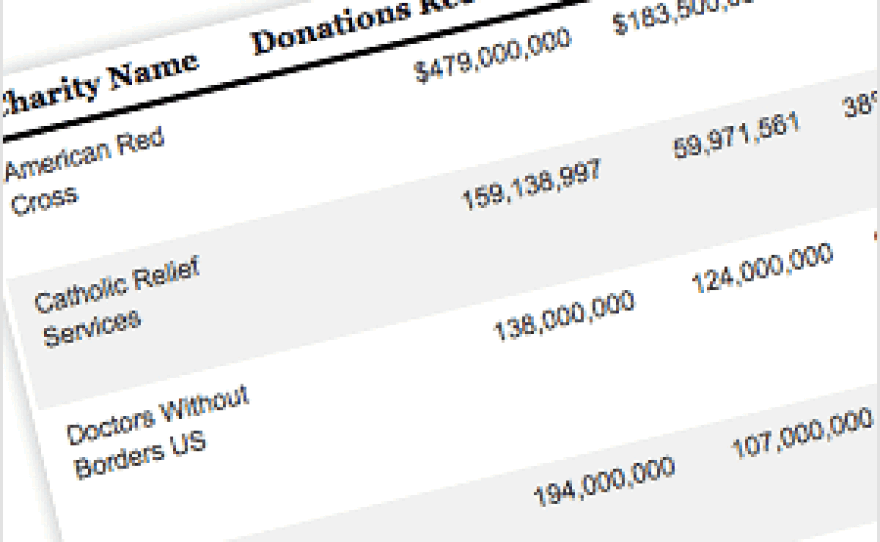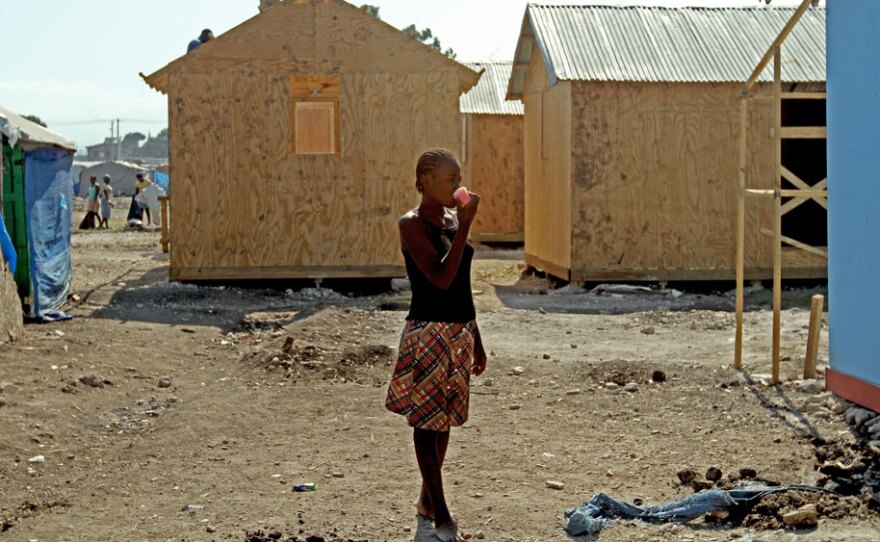After a magnitude 7 earthquake struck Haiti last year, Americans responded to the devastation generously, giving nearly $2 billion to hundreds of charities.
But one year later, much of that money remains unspent, and criticism is mounting that the international aid response has not moved fast enough to alleviate the suffering of the earthquake survivors.

On a recent day, about 200 young people gather on the back patio of the headquarters of the American Red Cross in Haiti. All are wearing clean white T-shirts with the charity's bright-red logo emblazoned on the front and back; they fill up Red Cross backpacks with boxes of soap.
Jean Louis Emmanuel, one of the health promoters, says they head out every day to 60 tent encampments throughout Port-au-Prince. He shows people how to properly wash their hands, especially after using the toilet and eating, to prevent the spread of cholera.
"Without this job, I would have no work at all," Emmanuel says.
Unspent Money In The Coffers
The American Red Cross says it has helped hundreds of thousands of Haitians and has spent more than a quarter of a billion dollars in the past year. It raised nearly twice that amount, however, and has been criticized for not spending more.
The Red Cross isn't the only charity with much of its donations still in the bank. A survey of 60 U.S. charities by The Chronicle of Philanthropy shows that less than 40 percent of the nearly $1.5 billion they raised has been spent.

Julie Sell of the American Red Cross says it would be foolish to spend so much money so quickly.
"The Red Cross has a real commitment to spending those dollars wisely and transparently," she says.
There are aid deliveries all over the city, but nearly a million people are still living under tents and tarps, few reconstruction projects have begun, and cholera continues to claim lives.
Unni Karunakara, president of Doctors Without Borders, says it's unconscionable that aid groups launched cholera fundraising appeals when their coffers remain filled.
"We are indeed accountable to the Haitian people, and I think we have a lot of explaining to do," Karunakara says.
Aid Groups' Critics And Defenders
Oxfam just released a report criticizing the slow pace of recovery, and watchdog groups like the Disaster Accountability Project are pushing U.S. charities to divulge more information about their activities. Ben Smilowitz heads the project.
"If a donor is going to invest in an organization to do relief work, they should know how detailed that organization's activities are, whether or not they're operating on a daily basis, whether or not they're operating on a weekly basis. And I challenge anyone to go to these groups' websites and try and figure out how sustained their operations are with the information they are given," Smilowitz says.
His organization sent a survey to 200 groups working in Haiti about their programs; only 38 responded.
U.N. Deputy Special Representative Nigel Fisher, who coordinates the work of nongovernmental agencies in Haiti, says he thinks the criticism is "simplistic and it shows a lack of understanding."
There are thousands of groups working in Haiti, he says, but the vast majority are small, faith-based organizations. Much of the work is done by about 20 large NGOs, and he admits that coordination was difficult at first.
"Coordination is about persuasion, it's about getting consensus, it's about deciding on priorities when people have different points of view. And sometimes you can't do that overnight," Fisher says.

For Every Step Forward, Two Steps Back
Aid workers say it's challenging working in Haiti. It's the poorest country in the Western Hemisphere, with few resources. Many say it feels like for every step forward, they take two back.
Take, for example, the situation at one tent encampment near Cite Soleil, one of Port-au-Prince's largest slums. Construction of 18-by-9-foot wooden shelters is fast and furious for many of the 800 families who have been living under tents and tarps.
The Haitian government owns the land, but it took until last summer for federal authorities to finally allow the Red Cross to build sturdier homes. Then a local official stepped in and took away half the land to build a school.
Wislyn Jean Charles, one of the lucky ones who got a new shelter, says now she can stand up inside a dry home. She has plastic flowers decorating the walls and a huge framed painting of the Last Supper over a full-size dining set.
She says she is so thankful to the foreigners for their help and hopes they all have long lives.
Copyright 2022 NPR. To see more, visit https://www.npr.org. 9(MDAzMjM2NDYzMDEyMzc1Njk5NjAxNzY3OQ001))







